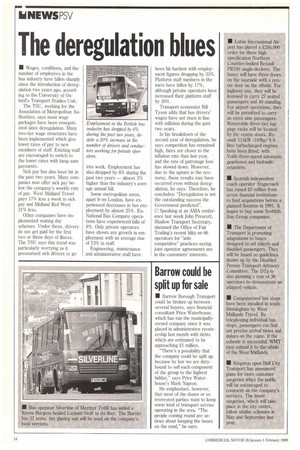The deregulation blues
Page 16

If you've noticed an error in this article please click here to report it so we can fix it.
• Wages, conditions, and the number of employees in the bus industry have fallen sharply since the introduction of deregulation two years ago, according to the University of Oxford's Transport Studies Unit.
The TSU, working for the Association of Metropolitan Authorities, says most wage packages have been renegotiated since deregulation. Many two-tier wage structures have been implemented which give lower rates of pay to new members of staff. Existing staff are encouraged to switch to the lower rates with lump sum payments.
Sick pay has also been hit in the past two years. Many companies now offer sick pay below the company's weekly rate of pay. West Midland Travel pays 17% less a week in sick pay and Midland Red West 21% less.
Other companies have implemented waiting day schemes. Under these, drivers do not get paid for the first two or three days of illness. The Tsu says this trend was particularly worrying as it pressurised sick drivers to go
into work. Employment has also dropped by 6% during the past two years — almost 2% higher than the industry's average annual fall.
Some metropolitan areas, apart frm London, have experienced decreases in bus employment by almost 25%. ExNational Bus Company operations have experienced falls of 9%. Only private operators have shown any growth in employment with an average rise of 13% in staff.
Engineering, maintenance and administrative staff have been hit hardest with employment figures dropping by 25%. Platform staff numbers in the mets have fallen by 17%, although private operators have increased their platform staff by 20%.
Transport economist Bill Tyson adds that bus drivers' wages have not risen in line with inflation during the past two years.
In his breakdown of the second year of deregulation, he says competition has remained high, fares are closer to the inflation rate than last year, ' and the rate of patronage loss has slowed down. However, due to the upturn in the economy, these results may have occurred even without deregulation, he says. Therefore, he concludes: "Deregulation is not the outstanding success the Government predicted".
0 Speaking at an AMA conference last week John Prescott, Shadow Transport Secretary, slammed the Office of Fair Trading's recent blitz on 66 operators for "anticompetitive" practices saying joint operator agreements are in the customers' interests.








































































































































